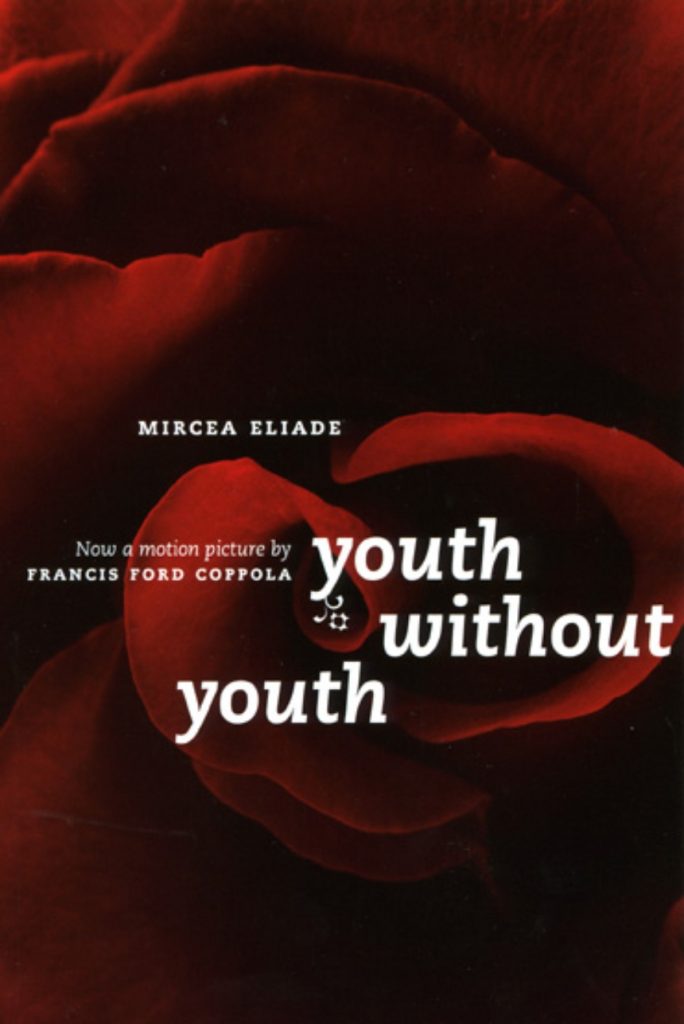
translated by Mac Linscott Ricketts
original publication (in Romanian): 1978-79
first English edition: 1988
grab a copy here or through your local independent bookstore or library
I’ve been intrigued by Mircea Eliade (1907-1986), the Romanian writer, philosopher, and historian, ever since I dedicated a month to Romanian SFT back in 2021. From what I know about Eliade, he pursued truth wherever it led him and was deeply interested in history, religion, philosophy, and the nature of narrative.
My edition of Youth Without Youth includes a foreword by filmmaker Francis Ford Coppola, who turned this slim novel into a film a couple of decades ago (it’s now on my watchlist). I’m not surprised that this story about rejuvenation, reincarnation, immortality, Nazi occult research, and knowledge of various kinds would attract the attention of someone like Coppola. And yet, Eliade is virtually unknown in America–even among those of us who regularly read SFT.
Youth Without Youth reminds me of Huxley’s Brave New World in that both are such novels of ideas that character development takes a backseat. The main character in Eliade’s book, though, is a bit more real–he has a rich inner life…ok, inner lives, since the lightning that struck him seems to have implanted another consciousness in his mind.
To explain: Dominic Matei is standing on a street corner in Bucharest on the night before Easter, 1938, ready to cross the street, when he is suddenly struck by lightning. According to the doctors and nurses at the hospital to which he’s taken, Dominic should have died. The burns all over his body and the fact that the lightning struck him directly on the head both suggest that Dominic is beyond lucky to still be alive.
As he recovers in the hospital, Dominic starts regenerating: his teeth fall out and new teeth grow in. He looks no older than thirty, and suddenly he can remember many of his favorite poems and philosophy texts. Even stranger, he is able to read in several languages, including Chinese and Albanian, despite having barely studied them in the past.
And then there’s that other voice in his head, which explains to Dominic that he can do now what he never thought possible–pursue his research and write his book without worrying about creeping dementia and physical deterioration. Unfortunately, the Nazis are on the lookout for people like Dominic, who can help them in their occult research. After all, if Dominic is the key to understanding rejuvenation and regeneration via electricity…well, many characters around Dominic know that that kind of knowledge should never fall into Nazi hands.
Dominic is smuggled into Switzerland and lives the rest of his long life traveling around the world, at one point living with a young German woman in India. Dominic helps this woman through the revelation that she shares a consciousness with a centuries-old female ascetic and master of Sanskrit writings.
One of the major, and very interesting, questions raised by the novel is this: what are the ethics of scientific experimentation when the goal is the evolution of human consciousness and knowledge? Many characters in the novel agree that the Nazis shouldn’t electrocute people in order to learn more about regeneration, but the doctors who treat Dominic conduct their own kind of experimentation, spending a lot of time asking him questions and trying to understand what happened to him. Another character declares that understanding regeneration is more important than the lives of individuals. Dominic, though, believes that he has been given a second chance to pursue knowledge, and that this is not something that can be shared with others. His experience with the German woman underscores this point–that only a small number of people are given this chance.
Eliade invites us to view Dominic within the Christian tradition by having him struck down on the night before Easter and then rejuvenate over the following weeks. What does it mean that Dominic, an aging, forgetful professor, is a kind of Christ figure? Does he have a responsibility to humankind or should he just enjoy his luck?
Youth Without Youth is a short but fascinating novel. Highly recommended.
